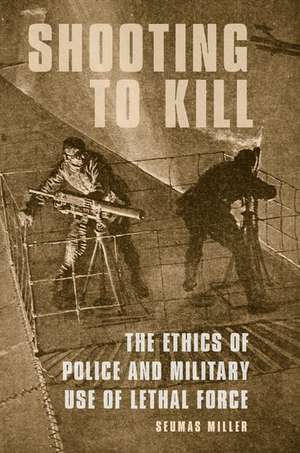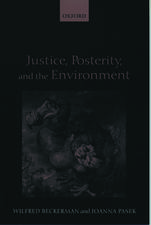Shooting to Kill: The Ethics of Police and Military Use of Lethal Force
Autor Seumas Milleren Limba Engleză Hardback – 8 dec 2016
| Toate formatele și edițiile | Preț | Express |
|---|---|---|
| Paperback (1) | 277.90 lei 32-37 zile | |
| Oxford University Press – 8 dec 2016 | 277.90 lei 32-37 zile | |
| Hardback (1) | 760.00 lei 32-37 zile | |
| Oxford University Press – 8 dec 2016 | 760.00 lei 32-37 zile |
Preț: 760.00 lei
Preț vechi: 1092.25 lei
-30% Nou
Puncte Express: 1140
Preț estimativ în valută:
145.43€ • 155.51$ • 121.25£
145.43€ • 155.51$ • 121.25£
Carte tipărită la comandă
Livrare economică 07-12 aprilie
Preluare comenzi: 021 569.72.76
Specificații
ISBN-13: 9780190626136
ISBN-10: 0190626135
Pagini: 312
Dimensiuni: 239 x 157 x 23 mm
Greutate: 0.57 kg
Editura: Oxford University Press
Colecția OUP USA
Locul publicării:New York, United States
ISBN-10: 0190626135
Pagini: 312
Dimensiuni: 239 x 157 x 23 mm
Greutate: 0.57 kg
Editura: Oxford University Press
Colecția OUP USA
Locul publicării:New York, United States
Recenzii
Miller is engaging the revisionists [theories of the use of lethal force] and putting forth a substantial alternative [theory] at a high levelhis institutional approach speaks to those people and their experiences who are (or may be) engaged in using lethal force in law enforcement and war.I also find Miller's "collective end theory" (CET) of joint action to be excellent He has an excellent approach to joint action that accounts for individual moral responsibility.
While many contemporary philosophers have addressed permissible uses of force, Seumas Miller's Shooting to Kill is unique in developing a unified theory regarding the permissible use of deadly force in private, law enforcement, and military contexts. Miller builds on previously published work in the field of collective responsibility to articulate a sophisticated theory of permissible violence taking into account differences in institutional contexts. The theory is philosophically intricate and yet practical enough to make a difference to concrete cases. It is a true achievement.
While many contemporary philosophers have addressed permissible uses of force, Seumas Miller's Shooting to Kill is unique in developing a unified theory regarding the permissible use of deadly force in private, law enforcement, and military contexts. Miller builds on previously published work in the field of collective responsibility to articulate a sophisticated theory of permissible violence taking into account differences in institutional contexts. The theory is philosophically intricate and yet practical enough to make a difference to concrete cases. It is a true achievement.
Notă biografică
Seumas Miler is a research professor (joint position) at the Centre for Applied Philosophy and Public Ethics at Charles Sturt University (Canberra), the 3TU Centre for Ethics and Technology at Delft University of Technology (The Hague) and the Oxford Uehiro Centre for Practical Ethics at the University of Oxford. He is the author or coauthor of over 200 academic articles and fifteen books, including Terrorism and Counter-terrorism (Blackwell, 2009), Investigative Ethics (Blackwell, 2014) and The Moral Foundations of Social Institutions (Cambridge University Press, 2010). He was recently awarded an EU Advanced Grant to undertake research on collective responsibility and counter-terrorism.















